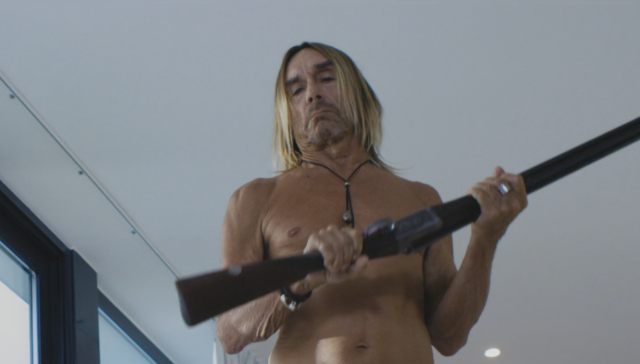In his first (shared) lead film role, Iggy Pop stars as the ageing, affluent musician Bill comfortably whiling away the winter years of his life in a lustrous Spanish mansion with younger, model wife Isabelle (Kasey Barnfield). Pop parades the surrounding Spanish mountains, hunting rabbits with a rifle in his trademark attire (or lack there of), leather pants/skin and cowboy hat, while Isabelle swims, sunbathes and sleeps with the pool man.
But the couple’s serenity is soon threatened upon the arrival of Lucas (Ben Lamb), Isabelle’s twenty-something step-son from a previous marriage. Lucas demands Isabelle pay him the money she inherited from his father’s death which she refuses. Unfazed by his menacing manner, Bill invites Lucas stay so the three can resolve the financial dilemma, but further complications arise when their guest schemes to slyly acquire what he believes is rightfully his.
After providing supporting performances in the likes of Cry Baby, The Crow: City of Angels and Jim Jarmusch’s Dead Man and Coffee and Cigarettes, this Spain set erotic thriller sees Iggy Pop command the screen with Barnfield and Lamb. Oozing self-confidence as a character that was probably no great stretch for the punk rat to conjure and will seem familiar to fans of his musical oeuvre as Bill isn’t a stone’s throw from the grizzly persona that Pop inhabits on stage. First time feature director Toby Tobias crafts a juddering sun-soaked neo-noir, tinted by the poisoned cocktail tropics that adorned the likes of Atom Egoyan’s Exotica, Donald Cammell’s Wild Side and Jonathan Glazer’s Sexy Beast, with which it also shares plot parallels.
Blood Orange also swanks a story and visual style similar to late 80s/ early 90s erotic thrillers like Wild Orchid, Colour of Night and Two Moon Junction, minus their ersatz-erotic sax instrumentals which are supposed to be sexy but are sordid in retrospect. Blood Orange’s soundtrack is in fact one of its better facets. A superb score by Tim Arnold compliments the drama/ visuals while songs contributed by other artists, including Pop himself, adorn its breezy milieu. But contrived plotting, perfunctory dialogue and dated devices cripple Blood Orange, especially in its glaringly wonky and fumbled latter half. Sleazy sequences featuring a frequently naked Isabelle swaggering about her shimmering settings, stopping only to drink or have sex with the pool man like a callous femme-fatale (while supposedly still loving Bill), contradicts her character core/conviction as a heroine.
Lucas is also emotionally acidic which leaves us only Bill to empathise with, but viewers will be disheartened to see him scrawled in a leathery ball/ wreck on the bathroom floor after popping pain killers to deaden his terminal illness. Writer/ Director Tobias fashions an enthralling first half with Pop as a leather clad rock phantom, squinting gnarly while topless like Clint Eastwood misshapen by decades of drug abuse and spitting lines like “It must have been a wild experience, having sex with your step mother,” as tracks like Tony Bennett’s The Good Life emboss the backdrop.
But when Pop is off screen, Blood Orange welters and crumbles into contrived mediocrity before concluding as a mere footnote to the once financially flourishing erotic thriller canon. Blood Orange concludes as a sun-blemished neo-noir which could have been better had more winning characters and a sound finale been crafted.







